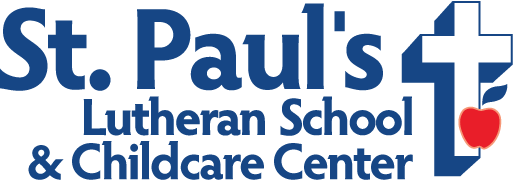Early Childhood Education
St. Paul's Early Childhood Education classes are located within St. Paul's Childcare Center. For children that need a little extra growth before entering Kindergarten, we offer a popular Young 5's class. Our ECE program begins at 8:15 AM on regularly scheduled school days with classes beginning at 8:30 AM.
Philosophy
"Let the little children come to Me, and do not hinder them, for the kingdom of God belongs to such as these... And He took them in His arms, put His hands on them, and blessed them." Mark 10:14-16
St. Paul's Lutheran Early Childhood program exists to proclaim Jesus Christ to the families and children enrolled in our programs. Scripture says everyone is in need of a Savior. It is the ministry of our school to proclaim the life, death, and resurrection of Jesus Christ. Through the work of the Holy Spirit, this proclamation works faith in the hearts of those who hear.
This teaching of Jesus Christ to the children is what sets our program apart from many others, both public and private. Christian emphasis occurs daily in all subject areas. Teachers and students witness to their faith in God. Students will worship, learn Bible stories, and pray daily in class. Teachers and students share God's life and forgiveness each day.
Kindergarten Entrance Behaviors
The following are general statements of behavior we hope to see in children entering kindergarten. Not all children will evidence all of these behaviors. Parental input is very important in determining whether an individual child is ready for kindergarten.
Social/Emotional Behaviors
- The child is showing progress in ease of separation from his/her primary caregiver.
- The child is developing positive means of expressing his/her emotions.
- The child is able to use words to express his/her needs.
- The child has had positive experiences with his/her peer/age group.
- The child is eager to begin school.
Physical Development
- The child enjoys physical activity.
- The child is beginning to exhibit small muscle control; coloring skills and the ability to manipulate small items are developing.
- The child exhibits increasing large muscle control and the ability to move smoothly through space.
- The child has been exposed to the proper use of a pencil, scissors, and glue.
Intellectual Behaviors
- The child demonstrates a desire to learn.
- The child is able to communicate verbally, sharing information about his/her own needs, knowledge, and experiences.
- The child is able to listen to an entire story and is beginning to show recall and understanding of the story.
- The child shows an interest in books.
- The child can recognize and write their first name, preferably in upper and lower-case letters.
- The child can count to at least 10.
- The child can follow one-step directions.
- The child is interested in exploring the world.
The Importance of Play
Some people view early childhood classrooms as places where children learn to play together. Some people view them as places where children learn numbers, letters, and other subjects. We believe both are true statements. Maria Montessori, a famous teacher of young students, said, "Play is the child's work." In play, children learn through engaging in real activities involving tangible objects. During this kind of play, children increase their skills, creativity, social understanding, and understandings of the world around them. Our program is a combination of structured and unstructured play along with structured academic activities.
Meaningful learning for a young child often occurs during periods of free choice play. This kind of learning is most likely to occur when a child has a choice of activities and a choice of solutions to the problems or situations inherent in the choices made. When a child only imitates alternatives modeled by the teacher, we do not call this play. Learning then becomes drill.
In our early childhood programs we attempt to balance the amounts of time spent in play with the more formal group instructional times and activities. We allow the children to actively respond to the environment we carefully plan.
Children will have the opportunity to role-play life situations; building intricate creations out of blocks and other materials, sorting, classifying, smelling, touching, tasting, exploring, questioning, and doing many other activities each day. At times the children will be active and noisy. Learning will be taking place!





